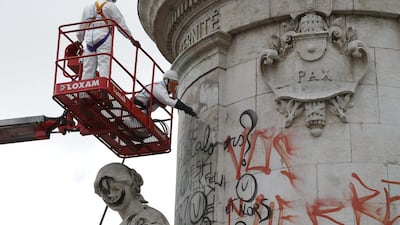NICE // Jean-Michel reflects on the rare sight of empty tables at his seafront cafe on the French Riviera in high season and allows himself a philosophical sigh.
“We are not a business of need, but one of pleasure,” he says. “If they’re just thirsty, they can buy a drink from a shop. Our customers come to relax, look out to the sea or gaze at other tourists going by. And too many people don’t feel that happiness just now.”
For all the spirit of defiance displayed during the recent wave of terrorist attacks, France has lost some of its celebrated joie de vivre.
The beaches are still crowded and on the Cote d’Azur, as in Paris, people are determined to enjoy the summer sunshine.
But tourism numbers are down. A government minister has confirmed there were 10 per cent fewer overnight stays by foreigners in June and July than in the same period last year. Although 2015 was a record year for French tourism, with 85 million international visitors, when the last of the holidaymakers have gone home at the end of this summer, the providers of accommodation, dining out and attractions may be seriously out of pocket.
Even the national obsession with totting up motorway congestion on the busiest weekend of the summer showed the length of traffic jams down from a cumulative 1,000 kilometres in 2014, to under 700km on the equivalent day this year.
Along the Mediterranean coastline from Monaco and the Italian border to Marseille, emotions remain raw after the horror of Bastille Day, when a Tunisian delivery driver used a 19-tonne hired lorry as a lethal weapon on the Promenade des Anglais in Nice.
It hardly helps that each week brings some new development in the fight against terror. Since the carnage on July 14, a Catholic priest has been murdered in his Normandy church, there have been arrests of other suspected extremists and the Nice death count has risen to 85 from an initial toll of 84.
The French government has identified more than 60 big festivals and other events that will go ahead only if they pass extensive security reviews.
The “braderie” in Lille, Europe’s largest flea market held on the first weekend of every September in the northern city, is the most prominent casualty so far. Its cancellation will have a severe effect on the economy of France’s fourth-largest city, given the massive crowds – 2.5 million last year – it always attracts.
Mayor Martine Aubry spoke sadly of “risks we cannot reduce” and many Lille residents accept the decision as unavoidable. But there is dissent. “The tourist season is already not great,” one 19-year-old man, identified as Bad, told France 3 television. “Now we’re sacrificing our September festival for fear of a band of cretins.”
The town council in one Riviera resort, Le Lavandou near Saint-Tropez, has banned the open-air services on the seafront that had become a feature of Sunday mornings in summer months.
With political leaders regularly referring to being “at war”, and soldiers patrolling locations where crowds gather, the wariness is not surprising. Eric Lecornu, who lives in Saint-Etienne-du-Rouvray, the Normandy town south of Rouen where the priest was killed, says he used to call his son in Paris to check he was safe. “Now it is him calling me, ‘Dad are you OK?’. You never know, it can happen anywhere.”
French Muslims are doubly affected. Already terrified of being caught up in an attack – a Muslim died in the Charlie Hebdo killings and more in the Paris and Nice massacres – they have to endure unjust suspicion from others.
But many in France are triumphing above natural fear. Mohamed Henni, a Muslim in Marseille, posted a video clip denouncing ISIL in expletive-filled terms. Others in France mock the terrorist organisation on Twitter.
This reluctance to allow terrorism to disrupt life is exemplified by Anthony Brown, a long-term British resident of Paris married to a Frenchwoman.
“Yes, we are a little more anxious and my wife is aware of the risk on her commute. But we at least try not to let it stop us doing what we want,” he said. “My daughter came back from university in England and made a point of going to all the sorts of places that were attacked on November 13.”
And similarly, when Benoit, a Parisian businessman, was asked if he had changed his habits, lost his zest for life or begun avoiding certain locations, he replied: “No, no and no. But it can be hard work and we need to take care of one another.”
Pierre Nadir, a travel specialist, told Le Journal du Dimanche newspaper that terrorism offers only one explanation for the reduction in foreign visitors. "The taxi-drivers' protests in January [over unregulated competition], then demonstrations against new employment laws and train and refuse-collection strikes during Euro 2016 tarnished France's image."
And the effects of social discontent are felt by the French, too.
“Terrorism is obviously important, “ says Jean-Michel, left to contemplate the likelihood of a poor season at his cafe. “But even without it, France’s problems mean people just don’t have the feel-good factor.”
foreign.desk@thenational.ae
* Additional reporting Agence France-Presse


